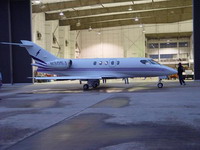Airlines get more flight flexibility
With a record number of flights this summer, the Federal Aviation Administration would expand the use of an air traffic control strategy intended to minimize weather-related delays.

The agency's "airspace flow program" allows airlines to choose between flying longer routes to avoid stormy weather or accepting delays that are aggravating for fliers and costly for the industry.
"If your flight isn't scheduled to fly through bad weather you don't have to sit on the tarmac," FAA Administrator Marion Blakey said in a prepared statement. "If it is (affected by bad weather), your airline has the choice of taking a delay... or flying around the storm."
The program was introduced last year in seven high-traffic, air-travel regions in the Northeast, reducing delays due to bad weather by 9 percent, the FAA said. This summer the program will be used in a total of 18 regions, including parts of the South and Midwest.
The FAA, which developed the program with input from industry representatives, estimated the program will save $100 million (74.13 million EUR) per year in reduced costs for airlines and the public.
Sid McGuirk., associate professor of air traffic management at Embry-Riddle Aeronautical University in Daytona Beach, Florida, credited the FAA for its pragmatic approach to maintaining high safety standards, while addressing the complaints of airlines and corporate jets who felt many flights were being grounded unnecessarily.
"In years past they've erred on the side of caution, and the users have been screaming," McGuirk said. "This is a cautious move towards allowing the users to access the system in a way that doesn't overload the system and doesn't create a dangerous situation."
However, the National Air Traffic Controllers Association, the union that represents air controllers, says a shortage of air traffic controllers will make summer delays inevitable.
"You've got have more controllers," said Doug Church, spokesman for the controllers union, which is seeking to restart stalled negotiations on a new contract. "They're going to be working tired."
The FAA's actions came as the Air Transport Association, the airline industry's main trade group, forecast that a record number of airline passengers would fly during the Memorial Day holiday weekend and throughout the summer.
For a 10-day period around Memorial Day, the association predicts 21.4 million passengers worldwide will travel on U.S. airlines, up 3.3 percent from last year. Between June and August, the association forecasts 209 million passengers, up 3 percent from last year.
James May, the group's president, said in a statement that airlines "are maximizing their efforts to ensure that operations run smoothly for our customers."
Subscribe to Pravda.Ru Telegram channel, Facebook, RSS!





